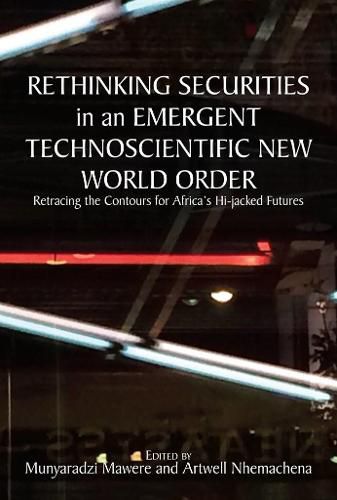Readings Newsletter
Become a Readings Member to make your shopping experience even easier.
Sign in or sign up for free!
You’re not far away from qualifying for FREE standard shipping within Australia
You’ve qualified for FREE standard shipping within Australia
The cart is loading…






This title is printed to order. This book may have been self-published. If so, we cannot guarantee the quality of the content. In the main most books will have gone through the editing process however some may not. We therefore suggest that you be aware of this before ordering this book. If in doubt check either the author or publisher’s details as we are unable to accept any returns unless they are faulty. Please contact us if you have any questions.
The emergent technoscientific New World Order is being legitimised through discourses on openness and inclusivity. The paradox is that openness implies vulnerability and insecurities, particularly where closure would offer shelter. While some actors, including NGOs, preach openness of African societies, Africans clamour for protection, restitution and restoration. Africans struggle for ownership and access to housing, for national, cultural, religious, economic, and social belonging that would offer them the necessary security and protection, including protection from the global vicissitudes and matrices of power. In the presence of these struggles, to presuppose openness would be to celebrate vulnerability and insecurities. This book examines ways in which emergent technologies expose Africans and, more generally, peoples of the global south to political, economic, social, cultural and religious shocks occasioned by the coloniality of the global matrices of power. It notes that there is the use - by global elites - of technologies to incite postmodern revolutions designed to compound the vicissitudes and imponderables in the already unsettled lives of people north and south. Particularly targeted by these technologies are African and other governments that do not cooperate in the fulfilment of the interests of the hegemonic global elites. The book is handy to students and practitioners in security studies, African studies, development studies, global studies, policy studies, and political science.
$9.00 standard shipping within Australia
FREE standard shipping within Australia for orders over $100.00
Express & International shipping calculated at checkout
This title is printed to order. This book may have been self-published. If so, we cannot guarantee the quality of the content. In the main most books will have gone through the editing process however some may not. We therefore suggest that you be aware of this before ordering this book. If in doubt check either the author or publisher’s details as we are unable to accept any returns unless they are faulty. Please contact us if you have any questions.
The emergent technoscientific New World Order is being legitimised through discourses on openness and inclusivity. The paradox is that openness implies vulnerability and insecurities, particularly where closure would offer shelter. While some actors, including NGOs, preach openness of African societies, Africans clamour for protection, restitution and restoration. Africans struggle for ownership and access to housing, for national, cultural, religious, economic, and social belonging that would offer them the necessary security and protection, including protection from the global vicissitudes and matrices of power. In the presence of these struggles, to presuppose openness would be to celebrate vulnerability and insecurities. This book examines ways in which emergent technologies expose Africans and, more generally, peoples of the global south to political, economic, social, cultural and religious shocks occasioned by the coloniality of the global matrices of power. It notes that there is the use - by global elites - of technologies to incite postmodern revolutions designed to compound the vicissitudes and imponderables in the already unsettled lives of people north and south. Particularly targeted by these technologies are African and other governments that do not cooperate in the fulfilment of the interests of the hegemonic global elites. The book is handy to students and practitioners in security studies, African studies, development studies, global studies, policy studies, and political science.